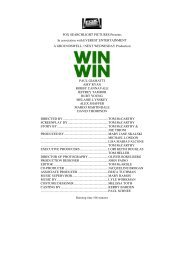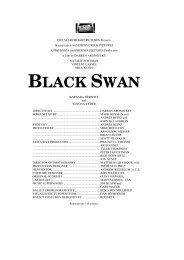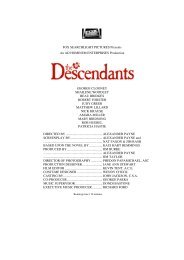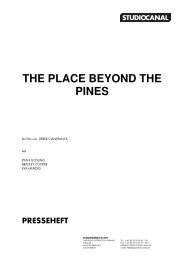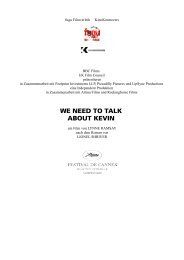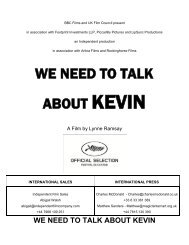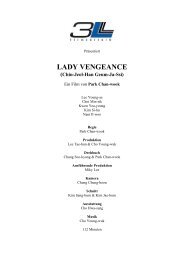TAKE THIS WALTZ - Mongrel Media
TAKE THIS WALTZ - Mongrel Media
TAKE THIS WALTZ - Mongrel Media
You also want an ePaper? Increase the reach of your titles
YUMPU automatically turns print PDFs into web optimized ePapers that Google loves.
in around neighbourhood restaurants and cinemas. So she placed the story right onto the<br />
sidewalks, streetcars and beaches which she walks every day.<br />
The title of the film, Take This Waltz, comes from the Leonard Cohen song of the same name,<br />
the words of which Cohen interpreted from “Little Viennese Waltz” by the modernist poet,<br />
Frederico Garcia Lorca, who was assassinated in 1936 during the Spanish Civil War.<br />
Now in Vienna there's ten pretty women. There's a shoulder where<br />
Death comes to cry. There's a lobby with nine hundred windows.<br />
There's a tree where the doves go to die.<br />
“The lyrics are so tragic and romantic,” declared Polley. “You never completely understand it,<br />
but it makes perfect sense on some deep, emotional level. I listened to it non‐stop while writing<br />
the screenplay and it informed the tone of what I wanted to accomplish.”<br />
In the story, Lou is the good husband, durable in his affection for his wife, grounded in his<br />
kitchen, as he diligently works his way through his chicken recipes; Margot, however, is a<br />
zephyr. Temperate in her self‐awareness, untethered by intention, she is easily propelled by<br />
gusts of inspiration coming from others. Side by side, making all the proscribed choices young,<br />
urban couples are advised to make, they move towards their future. Lou, contentedly – Margot,<br />
because she is his wife.<br />
For Polley, this opening scene in the kitchen, domestic, yet dull, approaching claustrophobic;<br />
peaceful, yet intensely restless, is a bookend for the film. “I start and end the film with this<br />
scene, even though a great deal goes on in between,” said Polley, “I wanted to make a film<br />
about desire, not a philosophical essay, but to be inside of it, to feel how delicious it is, and how<br />
difficult it is for us, as human beings, to either turn our backs on that sensation or to live with<br />
the primal gap it creates, one that needs to be fulfilled. I wanted to show the process of<br />
someone trying to escape that essential state of being and how it doesn’t always work.”<br />
In many respects, Take This Waltz is a coming of age movie about a woman in her late 20s, for<br />
whom the veil concealing the reality of romance and relationships truly falls away, revealing an<br />
emptiness that cries out to be addressed. “For women like Margot, and most women I know in<br />
their 30s,” said Polley, “there is a point when they realize the ‘happily ever after’ relationship<br />
fairytales they were told about as a child are not quite true. If you’re lucky, there is a great love,<br />
but apart from that, how do you know if a relationship is ‘wrong’ or if needing/wanting/desire is<br />
a function of life being complicated? It’s not simple. You may be in a relationship where you are<br />
mostly happy, but also sad or angry ‐ and nothing prepares us for that.”<br />
The emotional reality of relationships is complicated by the pervasive happiness imperative that<br />
runs through our lives. Relationship guidelines abound in books, magazines and online, dictating<br />
the levels of happiness we should be experiencing with our partners: are your needs being met?<br />
Can you communicate? Do you still laugh? Do you still enjoy being alone with them? Can you<br />
still overlook minor annoyances? Polley weighs in on this subject: “I think we live in a culture<br />
where if there is something missing in a relationship, then there is something wrong. It can be<br />
fixed, we are told, and it’s a failure to not fix it,” she said.<br />
4



